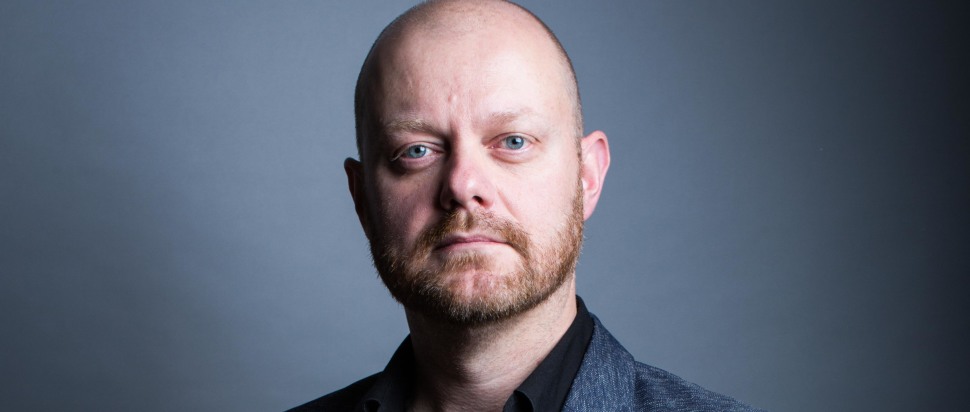Alexandre O. Philippe on new documentary Lynch/Oz
Alexandre O. Philippe takes a new deep dive into a corner of film culture, exploring the links between David Lynch's nightmarish worlds and The Wizard of Oz
There are few Hollywood films as influential as The Wizard of Oz, and there seem to be few people who have been more influenced by it than David Lynch. After diving into the critical conversations and cultural psyches surrounding Star Wars, Psycho, Alien and The Exorcist, Alexandre O. Philippe’s latest docu-essay picks the brains of critics and filmmakers – all Lynch superfans – to investigate the link between the technicolour land of Oz and the great American surrealist.
Unlike 78/52 (Philippe’s dissection of Psycho’s shower scene) or Memory (his dive into the mythical roots of Alien), Philippe structured Lynch/Oz as six sequential monologues, letting talents like Karyn Kusama, David Lowery and directing duo Justin Benson and Aaron Moorhead explore the full extent of their thoughts. “The first step, once we had agreed to do this together, was to set up what I call a jazz interview,” Philippe explains. “I got them on the phone and I recorded very low-res, just on my iPhone, the proceedings. The shortest was about 90 minutes, the longest was about three-and-a-half hours. We were riffing on the idea of Lynch and Oz and I was fishing for what could be their theory.”
Hearing passionate speculation on Lynch’s influences, as well as testimonies of how his filmography inspired generations of creatives in kind, is an engrossing and illuminating experience. It seems Philippe asked of his subjects a similar commitment to the abstract that Lynch’s films ask of their audience. “You have to go after people who are going to have an interesting theory,” he says, “and who are also willing to go down this particular rabbit hole with you, go all the way there.”
After transcribing these “jazz interviews”, Philippe would work back and forth with each speaker on what became their essay, only then sending them to recording studios. An exception to this preparation was legendary filmmaker John Waters, whose discussion of his directing peer sounds noticeably more conversational. “I felt like it was asking a little bit too much of the great John Waters to do [all] that,” says Phillippe. “So for [Waters], we sent him straight to a recording studio and I just kept fishing until I felt like I had enough. And I got his chapter based on what he gave me.”
Philippe’s dissection of Psycho’s shower scene or his dive into the mythical roots of Alien features myriad famous talking heads analysing these iconic films. Lynch/Oz, however, only features its celebrity contributors on the soundtrack. Each essay is aided only by a vast variety of film and archive footage, something that immensely complicated the editing process. “It’s massively challenging to not have the luxury to cut back to a talking head,” he reveals, before singing the praises of his editor David Lawrence. “David had all these folders of clips, and for certain moments, he would create folders with several contenders for each little moment, and we would look at them and review and discuss which one we wanted to use. And when you multiply that by, I don't know what, 2000 clips?” The mind boggles. “It’s a legitimate art form.”
David’s brother, Aaron, scored the film, having the mammoth task of merging the iconic music synonymous with Oz and Lynch’s worlds – with the caveat that he could only use electric guitar. “I love that kind of restriction of, ‘This is your sandbox, one electric guitar, and that's all you have. Now play within that.’ It's very similar to what we did on Leap of Faith” – Philippe’s film on The Exorcist where the only interviewee was its director, William Friedkin. “That was a cello only, single cello score that was supposed to essentially echo William Friedkin throughout the film.”
Philippe’s first films were a lot broader in tone, focusing on the expansive, eclectic fandoms of Star Wars and George A. Romero. As his career continued, his zeal for unpacking culture strengthened, even as the films developed a more refined critical voice. “The early films were more about pop culture,” he says, “but they're still about obsession in a way, and about these moments in cinema that are so culturally important, and so important to understand. I don’t make behind-the-scenes films, I make films about why movies matter.”
Lynch is famously reluctant to explain the deeper meanings of his work, so a film unpacking the intertextual resonance of his filmography could, on paper, seem redundant. But it turns out Philippe shares Lynch’s resistance to thematic dictation. “Lynch/Oz is not about explaining Lynch,” he stresses. “I think it's about opening more doors to more mysteries, if anything. It's fundamentally about the mysteries of influence and inspiration on the creative process. We're just pointing the way to the red shoes and the curtains.”
Philippe did approach Lynch to appear in the film, but anticipated the inevitable rejection. “I mean, he was very nice about it, but he said, in classic Lynchian fashion, ‘I need to keep my eye on the doughnut.’ So that was that. That’s the best response you can get from him.”
Lynch/Oz is released 2 Dec by Dogwoof
